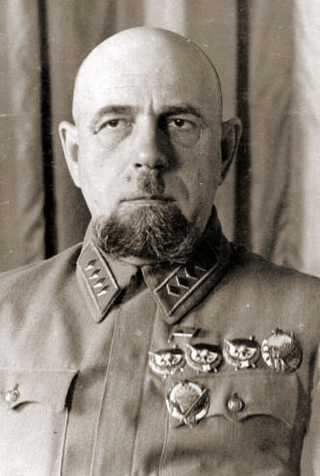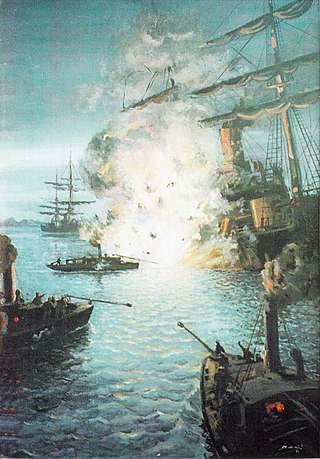Related Research Articles

The Bolsheviks, led by Vladimir Lenin, were a faction of the Marxist Russian Social Democratic Labour Party (RSDLP) which split with the Mensheviks at the Second Party Congress in 1903. The Bolshevik party seized power in Russia in the October Revolution of 1917, and was later renamed the Communist Party of the Soviet Union. Their ideology and practices, based on Leninist and later Marxist–Leninist principles, are known as Bolshevism.

Joseph Vissarionovich Stalin was a Soviet politician, Russian revolutionary, and political theorist who led the Soviet Union from 1924 until his death in 1953, ruling as a dictator after consolidating power in the late 1920s. He served as General Secretary of the Communist Party from 1922 to 1952, and as Chairman of the Council of Ministers from 1941 to 1953. Ideologically a Marxist and a Leninist, Stalin formalised the state ideology of Marxism–Leninism, while his own methods of governing and policies are known as Stalinism.

The Russian Revolution was a period of political and social change in the Russian Empire, starting in 1917. This period saw Russia abolish its monarchy and adopt a socialist form of government following two successive revolutions and a bloody civil war. The Russian Revolution can also be seen as the precursor for the other European revolutions that occurred during or in the aftermath of World War I, such as the German Revolution of 1918–1919.

Mikhail Ivanovich Kalinin was a Soviet politician and Russian Old Bolshevik revolutionary. He served as head of state of the Russian Soviet Federative Socialist Republic and later of the Soviet Union from 1919 to 1946. From 1926, he was a member of the Politburo of the Communist Party of the Soviet Union.

Ekaterine "Kato" Svanidze was the first wife of Joseph Stalin and the mother of his eldest son, Yakov Dzhugashvili.

Pavel Efimovich Dybenko was a Bolshevik revolutionary and a leading Soviet officer and military commander. He was arrested, tortured and executed during the Great Purge and subsequently rehabilitated during the Khrushchev Thaw.

Anton Nilson was a Swedish terrorist and militant socialist who was convicted of murder for a fatal bombing in 1908.
Kote Tsintsadze (1887–1930) was a Georgian Bolshevik who was the first chairman of Georgian Cheka and involved in the Russian Revolutions and the Sovietization of Georgia. He was purged under Joseph Stalin as a member of the Left Opposition within the Communist Party of the Soviet Union.

Roman Vatslavovich Malinovsky was a prominent Bolshevik politician before the Russian revolution, while at the same time working as the best-paid agent for the Okhrana, the Tsarist secret police. They codenamed him 'Portnoi'.

Simon Arshaki Ter-Petrosian, better known by his nom de guerre of Kamo, was an Old Bolshevik revolutionary and an early companion to Soviet leader Joseph Stalin.

The early life of Joseph Stalin covers the period from Stalin's birth, on 18 December 1878, until the October Revolution on 7 November 1917. Born Ioseb Jughashvili in Gori, Georgia, to a cobbler and a house cleaner, he grew up in the city and attended school there before moving to Tiflis to join the Tiflis Seminary. While a student at the seminary he embraced Marxism and became an avid follower of Vladimir Lenin, and left the seminary to become a revolutionary. After being marked by Russian secret police for his activities, he became a full-time revolutionary and outlaw. He became one of the Bolsheviks' chief operatives in the Caucasus, organizing paramilitaries, spreading propaganda, raising money through bank robberies, and kidnappings and extortion. Stalin was captured and exiled to Siberia numerous times, but often escaped. He became one of Lenin's closest associates, which helped him rise to the heights of power after the Russian Revolution. In 1913 Stalin was exiled to Siberia for the final time, and remained in exile until the February Revolution of 1917 led to the overthrow of the Russian Empire.
Joseph Stalin was the General Secretary of the Communist Party of the Soviet Union's Central Committee from 1922 until his death in 1953. In the years following Lenin's death in 1924, he rose to become the leader of the Soviet Union.

The 1907 Tiflis bank robbery, also known as the Erivansky Square expropriation, was an armed robbery on 26 June 1907 in the city of Tiflis in the Tiflis Governorate in the Caucasus Viceroyalty of the Russian Empire. A Bolshevik group "expropriated" a bank cash shipment to fund their revolutionary activities. The robbers attacked a bank stagecoach, and the surrounding police and soldiers, using bombs and guns while the stagecoach was transporting money through Erivansky Square between the post office and the Tiflis branch of the State Bank of the Russian Empire. The attack killed forty people and injured fifty others, according to official archive documents. The robbers escaped with 241,000 rubles.

The Unforgettable Year 1919 is a 1951 Soviet historical drama film directed by Mikheil Chiaureli.

The New Economic Policy (NEP) was an economic policy of the Soviet Union proposed by Vladimir Lenin in 1921 as a temporary expedient. Lenin characterized the NEP in 1922 as an economic system that would include "a free market and capitalism, both subject to state control", while socialized state enterprises would operate on "a profit basis".

The Kronstadt rebellion was a 1921 insurrection of Soviet sailors, naval infantry, and civilians against the Bolshevik government in the Russian port city of Kronstadt. Located on Kotlin Island in the Gulf of Finland, Kronstadt defended the former capital city, Petrograd, as the base of the Baltic Fleet. For sixteen days in March 1921, rebels in Kronstadt's naval fortress rose in opposition to the Soviet government they had helped to consolidate. Led by Stepan Petrichenko, it was the last major revolt against Bolshevik rule on Russian territory during the Russian Civil War.

The Battle of Tsaritsyn was a military confrontation between the Red Army and the White Army during the Russian Civil War for control of Tsaritsyn, a significant city and port on the Volga River in southwestern Russia.
Soviet democracy, or council democracy, is a political system in which the rule of the population is exercised by directly elected soviets, or workers' councils. The councils are directly responsible to their electors and bound by their instructions using a delegate model of representation. Such an imperative mandate is in contrast to a trustee model, in which the elected delegates are only responsible to their conscience. Delegates may accordingly be dismissed from their post at any time or be voted out (recall).

The action off Măcin was a naval engagement between a torpedo boat of the Romanian Navy with a mixed Romanian-Russian crew, together with another 3 Russian torpedo boats, and a monitor of the Ottoman Navy which took place during the 1877-1878 Russo-Turkish War. It was the first time in history that a torpedo craft sank its target without being sunk itself.
Sofia Ivanovna Sokolovskaya, also known as Yelena Kirillovna Svetlova was a Russian revolutionary, politician and senior official of the Soviet film industry until she became a victim of the Great Purge.
References
- ↑ Simon Sebag Montefiore, Young Stalin (Toronto: McArthur & Company, 2007), 168-9.